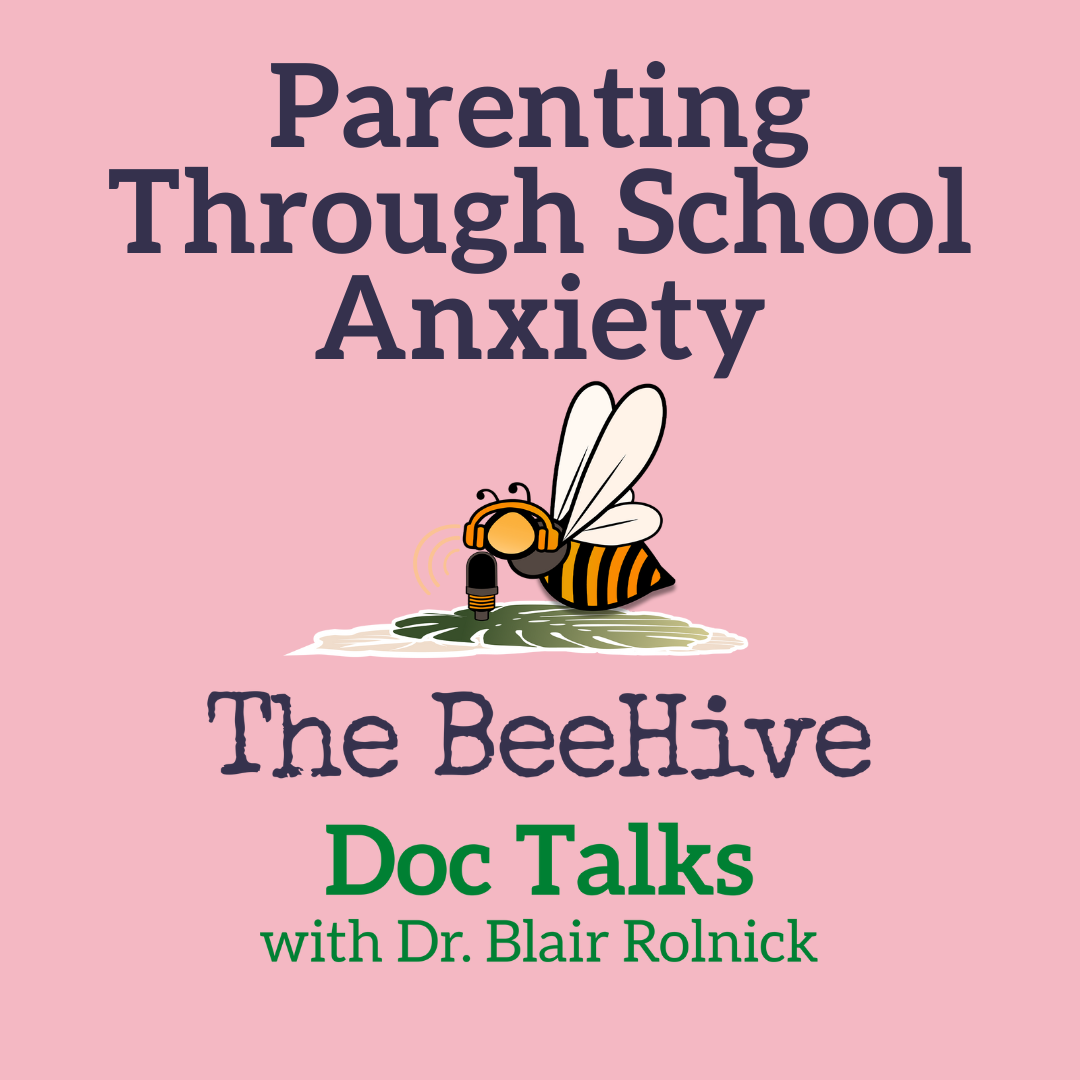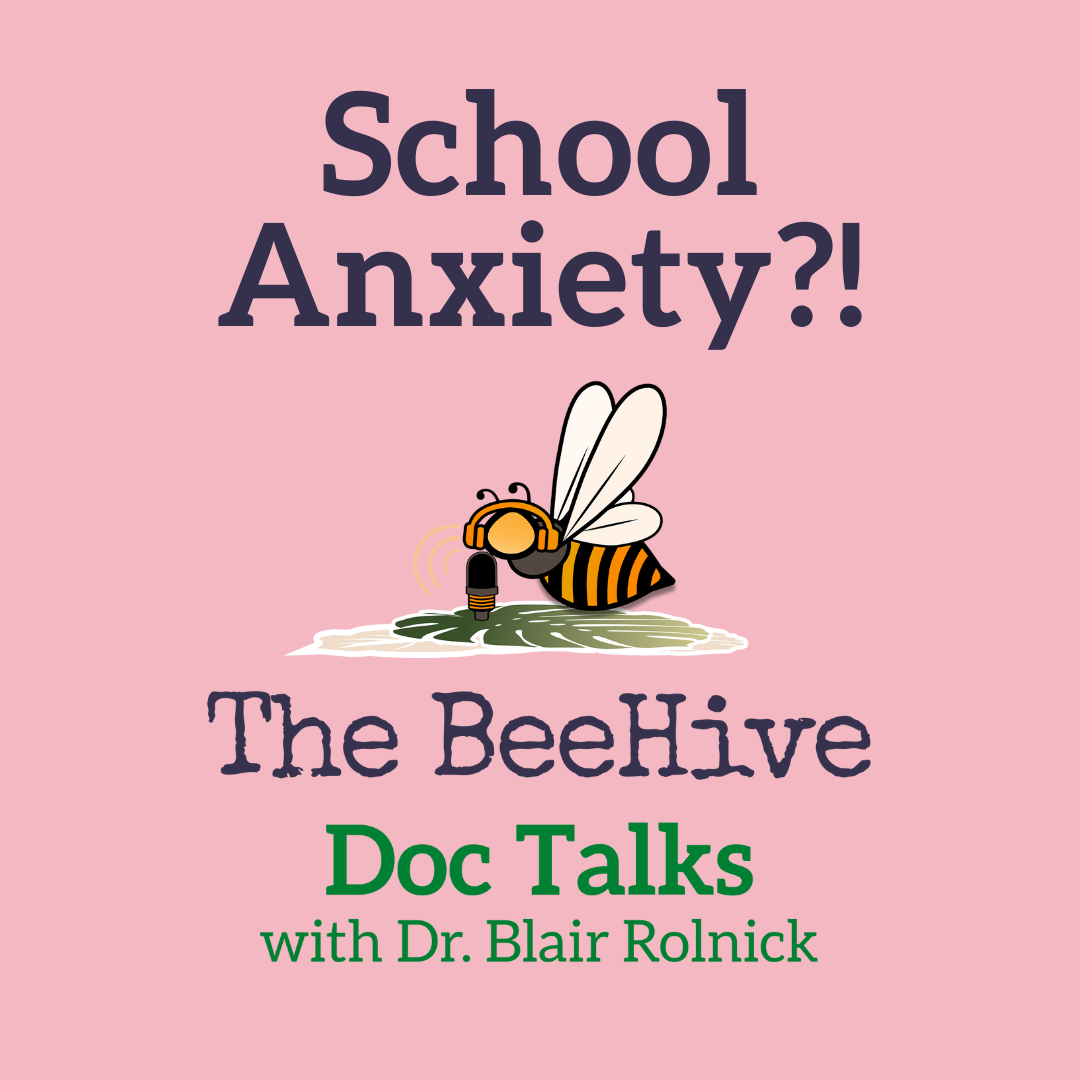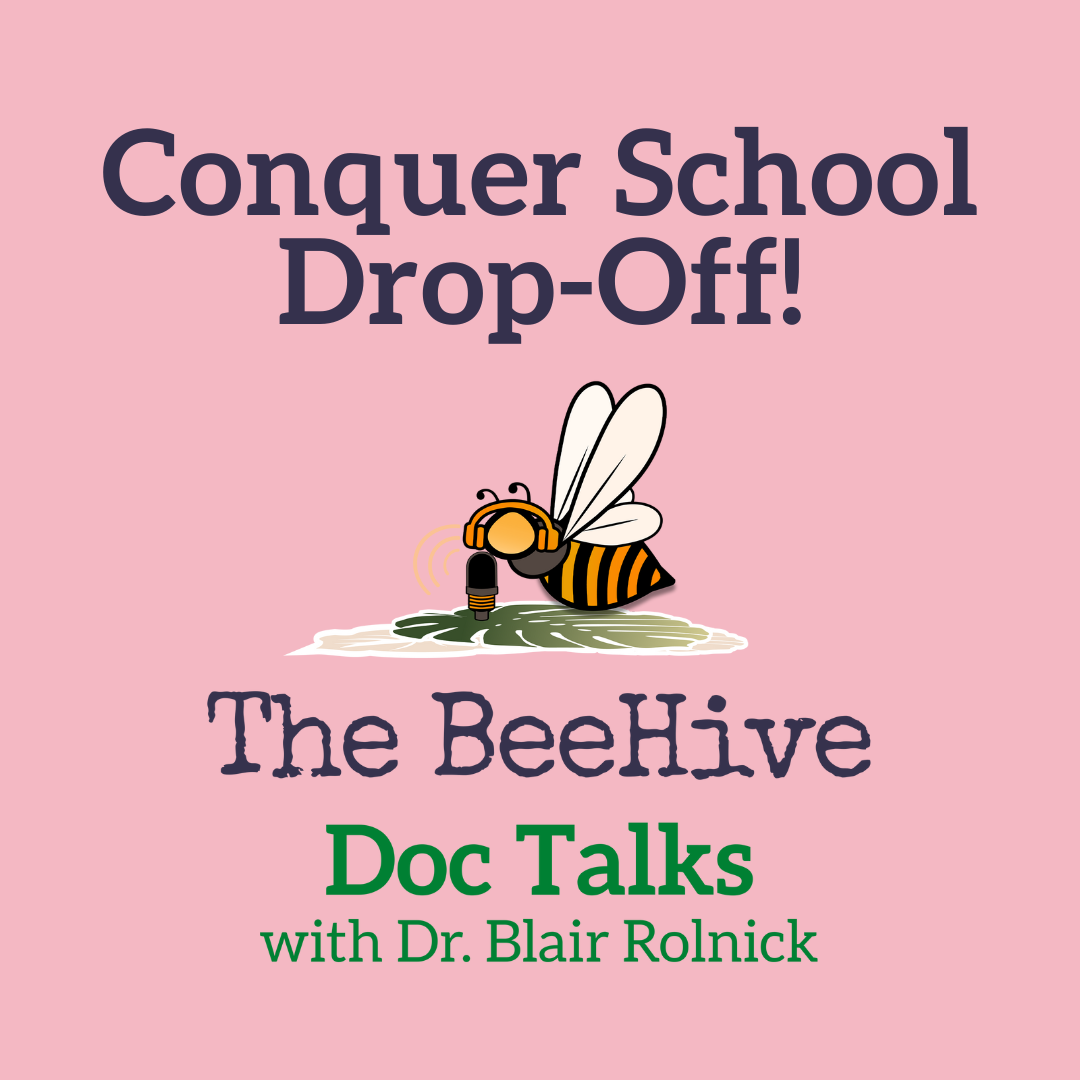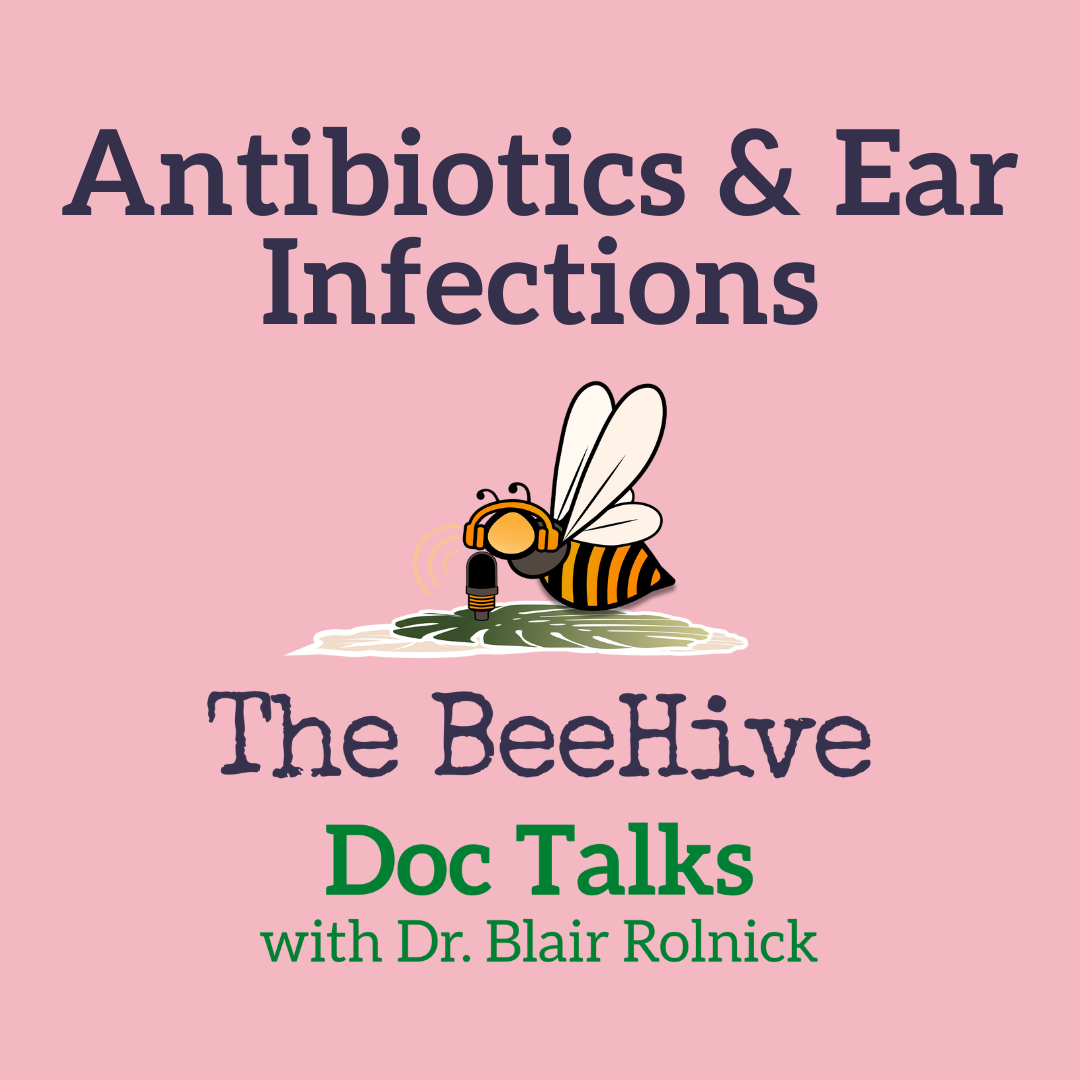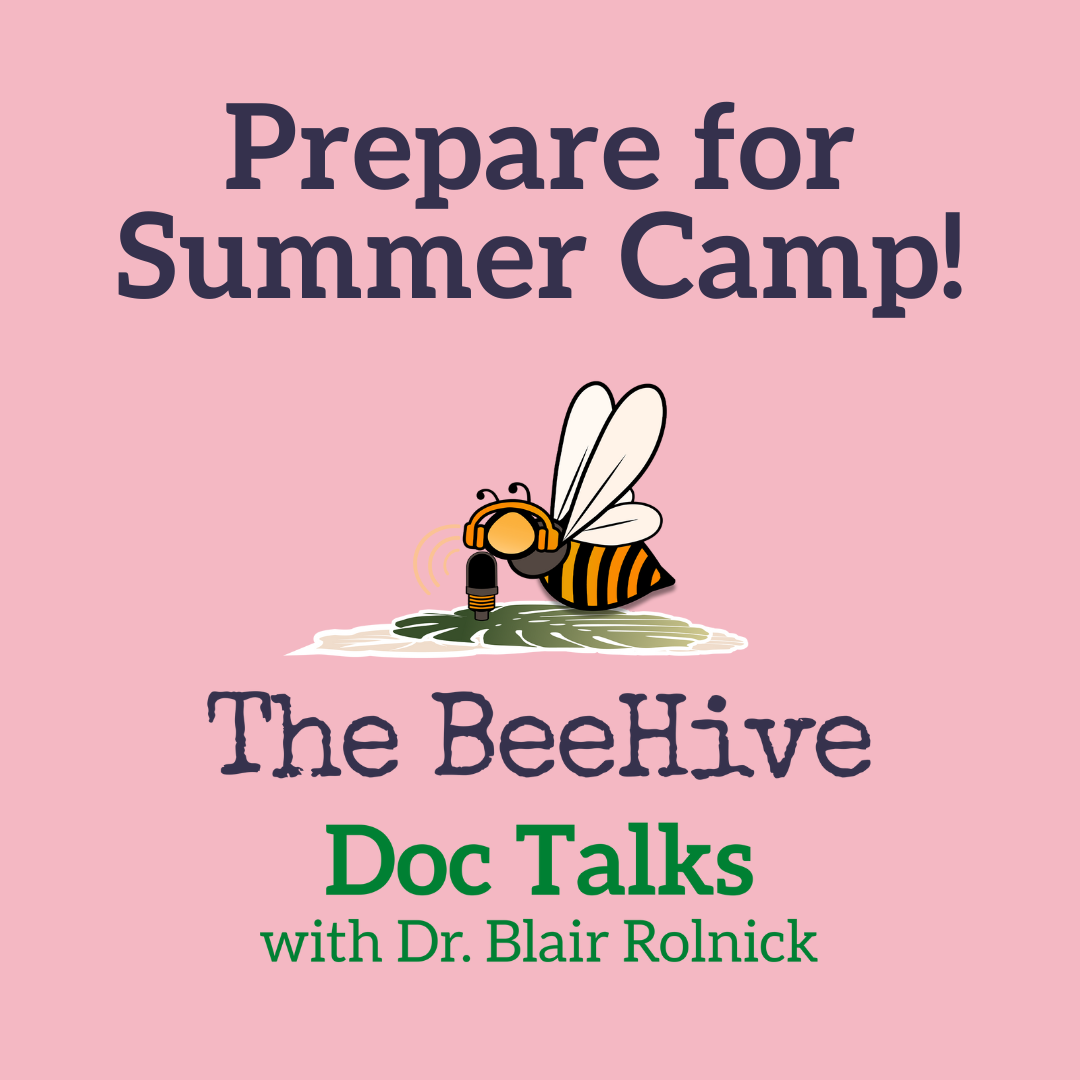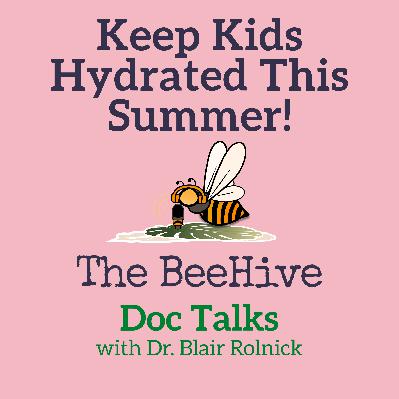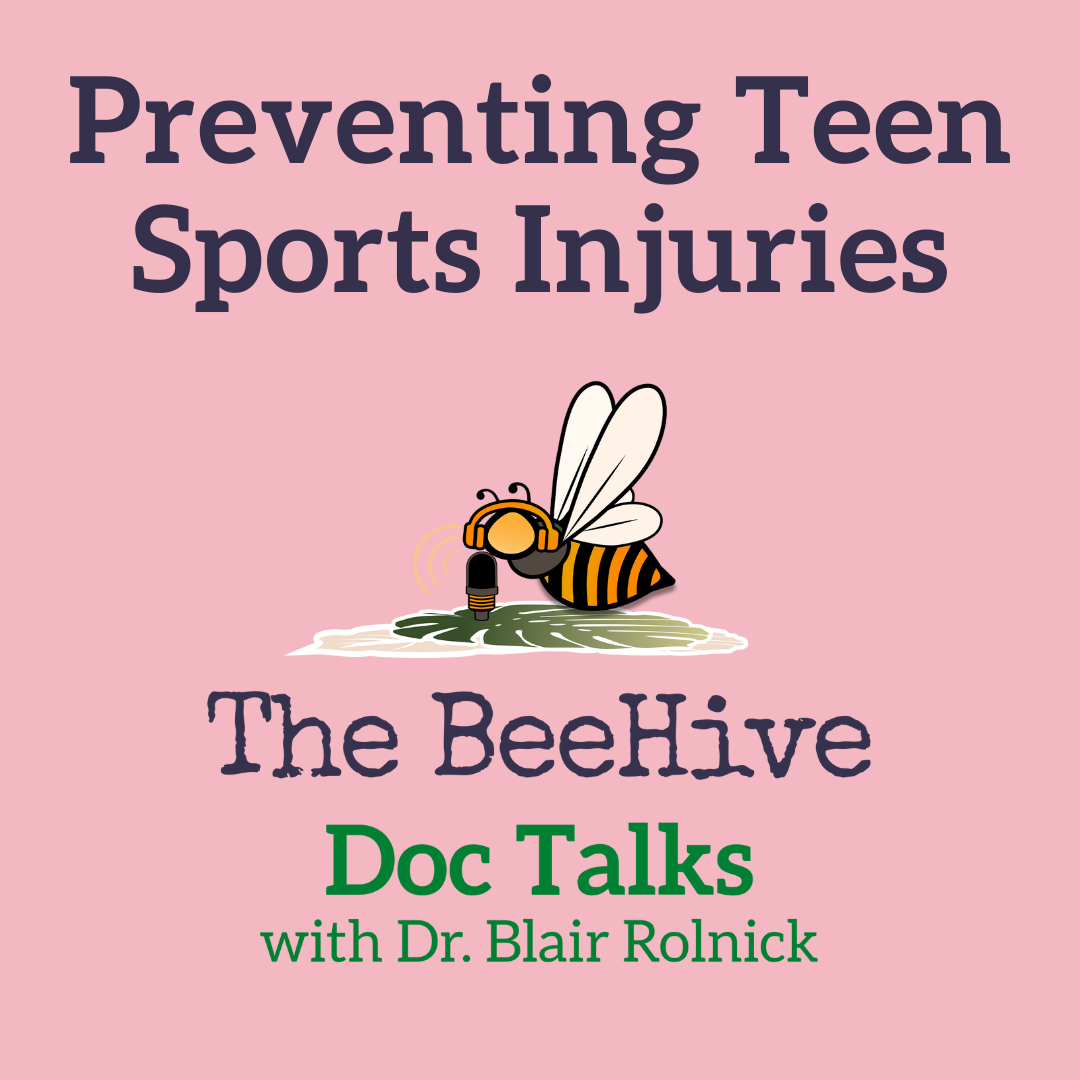Discover The BeeHive: Doc Talks
The BeeHive: Doc Talks

The BeeHive: Doc Talks
Author: Dr. Blair Rolnick
Subscribed: 0Played: 3Subscribe
Share
© 2022
Description
Being a parent comes with a lot of questions. Is this normal? Am I doing a good job? (The answer is yes by the way). This show is here to provide support and guidance based on medical literature and best practice guidelines. As a mother herself, Dr. Blair Rolnick knows how hard it is to find answers and advice based on research that you can trust. As a pediatrician with specialty training in pediatric emergency medicine and a certified lactation consultant, she brings specialist training to the table and seeks to use strong medical evidence to empower parents on their journey through parenthood.
84 Episodes
Reverse
In this episode of The Beehive, Dr. Blair Rolnick explores the challenges and treatment options associated with pediatric acne. Emphasizing the importance of treating acne early to prevent scarring and support mental health, she discusses two main types: inflammatory/cystic and comedonal acne. Dr. Rolnick highlights causes like clogged pores, hormones, and inflammation, and suggests proactive measures such as using non-comedogenic skincare products, avoiding harsh exfoliants, and reducing stress. For mild acne, treatments include over-the-counter benzoyl peroxide and retinoids, while moderate to severe cases may require antibiotics or hormonal interventions. She stresses the role of diet and lifestyle in managing acne and explains advanced options for acne scarring, like laser therapy and microneedling. Dr. Rolnick advocates for personalized care and encourages parents to support their children's treatment journey, emphasizing that a tailored approach from healthcare providers can significantly improve outcomes and boost confidence in adolescents. This episode on YouTube: https://youtu.be/ydtzHRmjjFs This information is for educational purposes only. It is not medical advice. Always seek medical advice from a qualified physician. For Dr. Rolnick's practice and more content, visit: https://beekindpediatrics.com/
In this episode of The Beehive Doc Talks, Dr. Blair Rolnick delves into the importance of monitoring cholesterol in children, highlighting that high cholesterol is not just an adult concern. She explains that cholesterol is necessary for building healthy cells but too much LDL (bad) cholesterol can lead to cardiovascular diseases, which often begin in childhood. The American Academy of Pediatrics recommends universal cholesterol screenings at ages 9-11 and 17-21, with selective screenings for at-risk children as young as 2. Dr. Rolnick emphasizes that high cholesterol in children is primarily genetic, although diet and lifestyle factors also play roles. She advises increasing fiber intake, incorporating plant-based foods, focusing on healthy fats, and considering omega-3 supplements. For some children, medications may be necessary. Dr. Rolnick concludes by stressing the importance of regular checkups, balanced diet, and physical activity for overall health and well-being. References: Srinivasan SR, Frontini MG, Xu J, Berenson GS. Utility of childhood non-high-density lipoprotein cholesterol levels in predicting adult dyslipidemia and other cardiovascular risks: the Bogalusa Heart Study. Pediatrics. 2006 Jul;118(1):201-6. doi: 10.1542/peds.2005-1856. PMID: 16818566. https://pubmed.ncbi.nlm.nih.gov/16818566/ GBD 2015 Obesity Collaborators et al. “Health Effects of Overweight and Obesity in 195 Countries over 25 Years.” The New England journal of medicine vol. 377,1 (2017): 13-27. doi:10.1056/NEJMoa1614362 https://pubmed.ncbi.nlm.nih.gov/28604169/ Jacobs DR Jr, Woo JG, Sinaiko AR, Daniels SR, Ikonen J, Juonala M, Kartiosuo N, Lehtimäki T, Magnussen CG, Viikari JSA, Zhang N, Bazzano LA, Burns TL, Prineas RJ, Steinberger J, Urbina EM, Venn AJ, Raitakari OT, Dwyer T. Childhood Cardiovascular Risk Factors and Adult Cardiovascular Events. N Engl J Med. 2022 May 19;386(20):1877-1888. doi: 10.1056/NEJMoa2109191. Epub 2022 Apr 4. PMID: 35373933; PMCID: PMC9563825. https://pubmed.ncbi.nlm.nih.gov/35373933/ This episode on YouTube: https://youtu.be/Hy0AMRgpa98 This information is for educational purposes only. It is not medical advice. Always seek medical advice from a qualified physician. For Dr. Rolnick's practice and more content, visit: https://beekindpediatrics.com/
In this episode of The Beehive Doc Talks, Dr. Blair Rolnick, a board-certified pediatrician and mother, addresses the uncertainties faced by new parents during the newborn period. Dr. Rolnick provides a comprehensive guide on when to call a pediatrician, covering critical topics like fever, jaundice, newborn breathing patterns, excessive crying, feeding issues, vomiting, diarrhea, concerning rashes, and unusual sleepiness. She emphasizes that while many symptoms can be normal, certain signs like a fever over 100.4°F, yellowing skin within 24 hours, persistent crying, or difficulty waking the baby warrant immediate medical attention. Dr. Rolnick reassures parents that they are not alone and that trusting their intuition is crucial. She encourages parents to err on the side of caution and seek guidance from their pediatrician whenever in doubt, underscoring that the health and well-being of their newborn are always worth the call. This episode on YouTube: This information is for educational purposes only. It is not medical advice. Always seek medical advice from a qualified physician. For Dr. Rolnick's practice and more content, visit: https://beekindpediatrics.com/
Welcome back to The Beehive Doc Talks. Dr. Blair Rolnick discusses transitioning one-year-olds from formula to cow's milk or dairy alternatives. At the 12-month mark, as babies no longer need formula's caloric density, full-fat cow's milk becomes a recommended option for its high fat, vitamin D, and calcium content, crucial for brain development. Dr. Rolnick advises an abrupt transition, consistent offering, and limiting cow's milk to less than 24 ounces daily to avoid iron deficiency anemia. For those avoiding cow’s milk, alternatives like soy, oat, and pea milk are discussed, but almond and rice milks are less recommended. Regardless of the choice, parents should consult a pediatrician or dietitian to ensure all nutritional needs are met. This episode on YouTube: https://youtu.be/bIU78Wg_Cwk This information is for educational purposes only. It is not medical advice. Always seek medical advice from a qualified physician. For Dr. Rolnick's practice and more content, visit: https://beekindpediatrics.com/
In this episode of The Beehive, Dr. Blair Rolnick, a board-certified pediatrician, discusses the importance of transitioning infants from bottle to cup by the 12-month mark. She explains that prolonged bottle use can lead to dental issues, increased ear infections, and hinders the development of self-soothing and sleep skills. Dr. Rolnick offers practical advice by encouraging parents to abruptly replace bottles with open-mouth cups, involving the child in choosing and decorating the cup, and ensuring the cup only contains age-appropriate drinks like water or cow's milk. She stresses the need for consistency and patience, emphasizing that adequate hydration can still be maintained through food. Dr. Rolnick urges parents to provide extra comfort and positive reinforcement during this transition period. Being patient and consistent will facilitate a smoother transition and support the child's overall developmental health. This episode on YouTube: https://youtu.be/X6mxI8ng2Q8 This information is for educational purposes only. It is not medical advice. Always seek medical advice from a qualified physician. For Dr. Rolnick's practice and more content, visit: https://beekindpediatrics.com/
Today, Dr. Blair Rolnick shares practical strategies for supporting high school students facing anxiety as they transition back to school. Anxiety in teens often shifts from separation fears to performance and social worries—like academic pressure, public speaking, and fitting in. Dr. Rolnick explains how to recognize the signs of unhealthy anxiety, including: Persistent stomachaches, headaches, or sleep issues Avoidance or withdrawal from friends and activities Declining grades or loss of enjoyment in school She also highlights effective ways parents can help, such as: ✅ Validating feelings without minimizing them ✅ Keeping routines predictable ✅ Partnering with schools and pediatricians ✅ Teaching coping skills & role-playing challenges ✅ Praising small acts of bravery The goal isn’t to eliminate anxiety—it’s to help teens face it, building resilience, confidence, and lifelong coping tools. Books: Growing Pangs by Kathryn Ormsbee - https://www.amazon.com/Growing-Pangs-Kathryn-Ormsbee/dp/0593301315/ Unstuck by Barbara Dee - https://www.amazon.com/Unstuck-Barbara-Dee/dp/153448986X 👂 Tune in to hear how empowered parents can make a real difference during this pivotal stage. 🔔 Don’t forget to subscribe to The Beehive for more expert advice on parenting, mental health, and resilience. Watch part one: https://youtu.be/uhz0wtLZiKk Watch part two: https://youtu.be/Pl7VQSMmnf8 This episode on YouTube: https://youtu.be/xMa1pvr0H1Un This information is for educational purposes only. It is not medical advice. Always seek medical advice from a qualified physician. For Dr. Rolnick's practice and more content, visit: https://beekindpediatrics.com/
🎙️ In this episode of The Beehive, Dr. Blair Rolnick explores school avoidance and separation anxiety in elementary-aged kids. Learn how anxiety can appear as stomachaches, headaches, or worries about friends and classrooms. Dr. Rolnick shares practical tips for parents—like routines, prep strategies, and encouraging bravery—plus how teachers can help with warm greetings and predictable classroom structures. ✨ Key takeaway: When parents and teachers work together, kids build confidence and adjust smoothly to the school year. The Color Monster Goes to School - https://www.amazon.com/Color-Monster-Goes-School/dp/0316537047 Watch part one: https://youtu.be/uhz0wtLZiKk This episode on YouTube: https://youtu.be/Pl7VQSMmnf8 This information is for educational purposes only. It is not medical advice. Always seek medical advice from a qualified physician. For Dr. Rolnick's practice and more content, visit: https://beekindpediatrics.com/
Worried about your child’s first day of pre-K or kindergarten? In this week’s episode of The Beehive Dock Talks, pediatrician and mom Dr. Blair Rolnick shares expert guidance on easing separation anxiety during this big transition. ✅ Why separation anxiety is a normal developmental milestone (linked to object permanence) ✅ Simple, practical strategies to make goodbyes easier—like short practice separations, fun routines, and teacher involvement ✅ When to seek extra support (e.g., if anxiety lasts 4+ weeks, disrupts daily life, or causes frequent physical complaints) ✅ Why separation anxiety is actually a sign of secure attachment, not school unreadiness With the right mix of confidence, consistency, and collaboration, your child can thrive in their new classroom. 🌟 If you’re preparing for the first drop-off, this episode will reassure you—and give you the tools to help your child feel safe, supported, and excited for school. Books that can help with the transition: Llama Llama Misses Mama - https://www.amazon.com/Llama-Misses-Mama-Anna-Dewdney/dp/0670061980 The Kissing Hand - https://www.amazon.com/Kissing-Hand/dp/1933718005 This episode on YouTube: https://youtu.be/uhz0wtLZiKk This information is for educational purposes only. It is not medical advice. Always seek medical advice from a qualified physician. For Dr. Rolnick's practice and more content, visit: https://beekindpediatrics.com/
Do All Kids with Ear Infections Need Antibiotics? In this episode of The Beehive, pediatrician Dr. Blair Rolnick breaks down one of the most common questions parents face: when do kids actually need antibiotics for ear infections? Learn: ✅ The 4 specific groups of children who should get antibiotics right away 💊 Why pain management is just as important as treatment 🕒 How long antibiotics should be used—based on your child’s age 👂 When to consider ear tubes 📹 How tools like video otoscopy and AI are improving diagnosis Dr. Rolnick dives into the latest, research-backed guidelines to help parents make informed decisions—because not all ear infections need antibiotics, and overuse can do more harm than good. 👩⚕️ Empower yourself with expert knowledge and find out why, sometimes, less really is more. 👉 Subscribe for more parenting advice, pediatric insights, and real talk from experts! This episode on YouTube: https://youtu.be/INPHg0H3uew This information is for educational purposes only. It is not medical advice. Always seek medical advice from a qualified physician. For Dr. Rolnick's practice and more content, visit: https://beekindpediatrics.com/
Is your child heading to summer camp for the first time? In this episode of The Beehive, Dr. Blair Rolnick—a board-certified pediatrician and mom—shares expert tips to help parents prepare their kids emotionally and practically for overnight camp. 🎒 Learn how to: - Normalize nerves & build excitement - Involve kids in planning & pack with purpose - Practice overnights at home - Encourage independence & problem-solving - Handle homesickness with confidence Dr. Rolnick explains when homesickness is normal—and when it may be a sign of something deeper like anxiety. With the right support, summer camp can be a major milestone in your child’s emotional growth and resilience. 👉 Subscribe for more parenting advice, pediatric insights, and real talk from experts! This episode on YouTube: https://youtu.be/N8_ordEsvns This information is for educational purposes only. It is not medical advice. Always seek medical advice from a qualified physician. For Dr. Rolnick's practice and more content, visit: https://beekindpediatrics.com/
Dr. Blair Rolnick focuses on keeping kids properly hydrated as temperatures rise in this week's episode. She explains why hydration is crucial for children's health—impacting everything from temperature regulation to brain function—and offers age-based guidelines for daily fluid intake. Dr. Rolnick highlights signs of dehydration to watch for, such as dry lips, fewer wet diapers, dark urine, crankiness, and dizziness. She shares creative tips to make drinking water more appealing, like using colorful bottles, fruit infusions, and hydrating snacks such as watermelon or cucumbers. While juice, milk, and sports drinks do count as fluids, she cautions against excessive sugar. Special advice is included for infants, emphasizing that babies under six months should only receive breast milk or formula. Ultimately, Dr. Rolnick encourages parents to make hydration a fun, daily habit—because keeping kids cool and hydrated is key to a happy, active summer. This episode on YouTube: https://youtu.be/hQMjtQzemjY This information is for educational purposes only. It is not medical advice. Always seek medical advice from a qualified physician. For Dr. Rolnick's practice and more content, visit: https://beekindpediatrics.com/
In this episode of The Beehive Doc Talks, Dr. Blair Rolnick tackles a timely concern: keeping infants and young children safe during a heat wave. She explains why babies and toddlers are at higher risk for heat-related illnesses—they have a larger surface-area-to-weight ratio and sweat less effectively than adults. Dr. Rolnick details early signs of overheating (like fussiness and redness) and outlines what to do if symptoms become severe, emphasizing the importance of calling 911 and using gentle cooling methods—not ice baths. She shares practical prevention tips, such as limiting outdoor time during peak heat, staying in shaded or cool places, using breathable materials in strollers, and offering extra hydration. For mild overheating, moving children indoors and rehydrating is key. Dr. Rolnick reassures parents that with awareness and simple precautions, families can enjoy summer safely, turning worry into confidence during those hot days. This episode on YouTube: https://youtu.be/q1yLpctxlX0 This information is for educational purposes only. It is not medical advice. Always seek medical advice from a qualified physician. For Dr. Rolnick's practice and more content, visit: https://beekindpediatrics.com/
In this episode of The Beehive with Dr. Blair Rolnick, parents of picky eaters get practical strategies and creative hacks to encourage kids to try new foods. Dr. Rolnick explains why children are naturally more selective—highlighting their sensitive taste buds and need for control—and shares top tactics like fun food presentations, letting kids play with their food, and involving them in cooking and shopping. She spotlights seasonal spring vegetables such as strawberries, carrots, peas, asparagus, spinach, and tomatoes, suggesting easy, appealing ways to introduce them. Dr. Rolnick urges parents to avoid mealtime power struggles, focus on positive experiences, and trust that selective phases will pass. The episode is packed with reassuring, actionable advice—reminding parents that patience, creativity, and a low-pressure approach can nurture adventurous, happy eaters for life. This episode on YouTube: https://youtu.be/faTBNx6Qtp0 This information is for educational purposes only. It is not medical advice. Always seek medical advice from a qualified physician. For Dr. Rolnick's practice and more content, visit: https://beekindpediatrics.com/
In this episode of Beehive Doc Talks, Dr. Blair Rolnick explores anxiety in elementary-aged children, highlighting signs and symptoms parents should be aware of. She emphasizes that while anxiety is a normal part of growth, persistent symptoms can impact daily activities and relationships. Symptoms may include excessive worrying, physical complaints like stomach aches and headaches, and behavioral signs like refusing school or seeking constant reassurance. Dr. Rolnick suggests methods like validating feelings, gradual exposure to triggers, and teaching coping strategies to support anxious children. She underscores the importance of structured routines, modeling healthy stress management, and using storytelling for emotional processing. If anxiety impacts a child’s daily life, seeking professional help is crucial, with cognitive behavioral therapy and parent coaching as key interventions. By employing evidence-based strategies, parents can empower their children to manage anxiety and build resilience, shaping their lifelong emotional skills. Books recommended: What To Do When You Worry Too Much - https://www.amazon.com/What-When-Worry-Much-What/dp/1591473144 The Invisible String - https://www.amazon.com/Invisible-String-Patrice-Karst/dp/031648623X Hey Warrior - https://www.amazon.com/Hey-Warrior/dp/0648488802 When My Worries Get Too Big - https://www.amazon.com/When-Worries-Get-Too-Big/dp/1937473805 This episode on YouTube: https://youtu.be/orDlkOGaVSI This information is for educational purposes only. It is not medical advice. Always seek medical advice from a qualified physician. For Dr. Rolnick's practice and more content, visit: https://beekindpediatrics.com/
Welcome back to the Beehive Doc Talks. Dr. Blair Rolnick, a pediatrician and mother, shares essential tips for preventing sports injuries in teens. She highlights common injuries like strains, sprains, fractures, concussions, and overuse injuries, and offers preventive strategies such as dynamic stretching, using proper equipment, focusing on core strength, cross-training, and proper technique training. Emphasizing the importance of rest and hydration, Dr. Rolnick advises on recognizing red flag symptoms that require medical attention, such as severe pain, persistent swelling, and signs of concussion, like confusion and dizziness. The episode concludes by urging parents to prioritize safety, ensuring their teens play safely while listening to their bodies. When in doubt, Dr. Rolnick stresses the importance of seeking medical advice to prevent more serious injuries. This episode on YouTube: https://youtu.be/fGIUcpTGVHw This information is for educational purposes only. It is not medical advice. Always seek medical advice from a qualified physician. For Dr. Rolnick's practice and more content, visit: https://beekindpediatrics.com/
In this episode of The Beehive, Dr. Blair Rolnick shares valuable insights on calming a fussy infant, emphasizing the importance of understanding and mitigating infant colic. She highlights the "5 S's" technique: ✅ swaddling ✅ side-lying position ✅ swaying ✅ shushing ✅ sucking She advises parents to properly swaddle their babies to prevent the Moro reflex. Dr. Rolnick also suggests utilizing water sounds, baby-wearing, and consulting pediatricians for thorough check-ups to rule out underlying issues like hunger, overtiredness, or medical concerns. She stresses the necessity of reaching out for support, whether from healthcare professionals or loved ones, to navigate the challenges of parenthood effectively. For first-time parents, these tips can be a lifesaver in managing a fussy infant, reinforcing the message that support and practical strategies can make a significant difference in soothing your baby. This episode on YouTube: https://youtu.be/29_O-WW1nlw This information is for educational purposes only. It is not medical advice. Always seek medical advice from a qualified physician. For Dr. Rolnick's practice and more content, visit: https://beekindpediatrics.com/
In this episode of The Beehive, Dr. Blair Rolnick discusses the importance of introducing an open mouth cup to babies around six months old. She advises against using sippy cups, as they promote sucking, which isn't developmentally appropriate for this age. Instead, she recommends a small, stainless steel, open-mouth cup for its durability and low bacterial growth. Between six and twelve months, babies should practice drinking from the cup with water, gradually building the skill by the time they drop the bottle at twelve months. Dr. Rolnick emphasizes modeling cup usage and maintaining consistency while avoiding sugary drinks to encourage healthy habits. For parents struggling with the transition, using a straw cup can be an intermediate step. Ultimately, fostering early use of an open mouth cup supports positive developmental and dental outcomes. This episode on YouTube: https://youtu.be/RX2S9ALBzsY This information is for educational purposes only. It is not medical advice. Always seek medical advice from a qualified physician. For Dr. Rolnick's practice and more content, visit: https://beekindpediatrics.com/
In this episode of The Beehive, Dr. Blair Rolnick details the critical role of iron in the first 1000 days of an infant's life, focusing on brain development, red blood cell production, immune function, sleep, and overall growth. She explains the importance of iron for neurodevelopment and immune defense, noting that iron deficiency can lead to poor cognitive outcomes and growth issues. Infants initially get iron from their mothers, then through breast milk or formula, and eventually from iron-rich solid foods such as meats, leafy greens, and legumes. Dr. Rolnick stresses the importance of monitoring iron levels in infants to prevent deficiencies, particularly for breastfeeding mothers who must ensure their own iron sufficiency. Proper iron intake is vital for babies' healthy growth and cognitive development, making it a pivotal focus in early childhood nutrition. This episode on YouTube: https://youtu.be/kSBJoBwVcGQ This information is for educational purposes only. It is not medical advice. Always seek medical advice from a qualified physician. For Dr. Rolnick's practice and more content, visit: https://beekindpediatrics.com/
Welcome back to The Beehive Doc Talks. Dr. Blair Rolnick continues her conversation with registered dietitian Katie Salmon, focusing on prenatal nutrition. Katie advocates for all pregnant women to consult a dietitian, especially those with pre-existing conditions like hypertension, diabetes, PCOS, or thyroid issues. She highlights the importance of nutritional guidance throughout pregnancy and postpartum to manage symptoms like nausea, fatigue, and headaches. Katie debunks common food safety myths, emphasizing that with proper handling, pregnant women can enjoy foods like soft cheeses and sushi. She also emphasizes the unique nutritional needs during twin pregnancies and close pregnancy spacing. This episode on YouTube: https://youtu.be/cgwEBCyzKlo This information is for educational purposes only. It is not medical advice. Always seek medical advice from a qualified physician. For Dr. Rolnick's practice and more content, visit: https://beekindpediatrics.com/
In this week's episode of BeeHive Doc Talks, Dr. Blair Rolnick welcomes Katie Salmon, a registered dietitian specializing in prenatal nutrition. Katie discusses the impact of maternal nutrition on both the mother's and the baby's long-term health, emphasizing the importance of proper nutrient intake during pregnancy to prevent conditions like gestational diabetes and postpartum thyroid disease. She also highlights the need for a comprehensive care team, including mental health support, nutritionists, and primary care providers, to ensure holistic maternal and fetal health. Dr. Rolnick and Katie stress that while maintaining proper nutrition is crucial, it should not overshadow the importance of mental health and support systems postpartum. The conversation underscores the necessity of simple, balanced meals and the ongoing monitoring of essential nutrients like vitamin D and DHA. Concluding on a powerful note, Dr. Rolnick reminds mothers and healthcare providers that the health and well-being of the mother directly influence the child's health. This episode on YouTube: https://youtu.be/9jPbK112QZE This information is for educational purposes only. It is not medical advice. Always seek medical advice from a qualified physician. For Dr. Rolnick's practice and more content, visit: https://beekindpediatrics.com/







